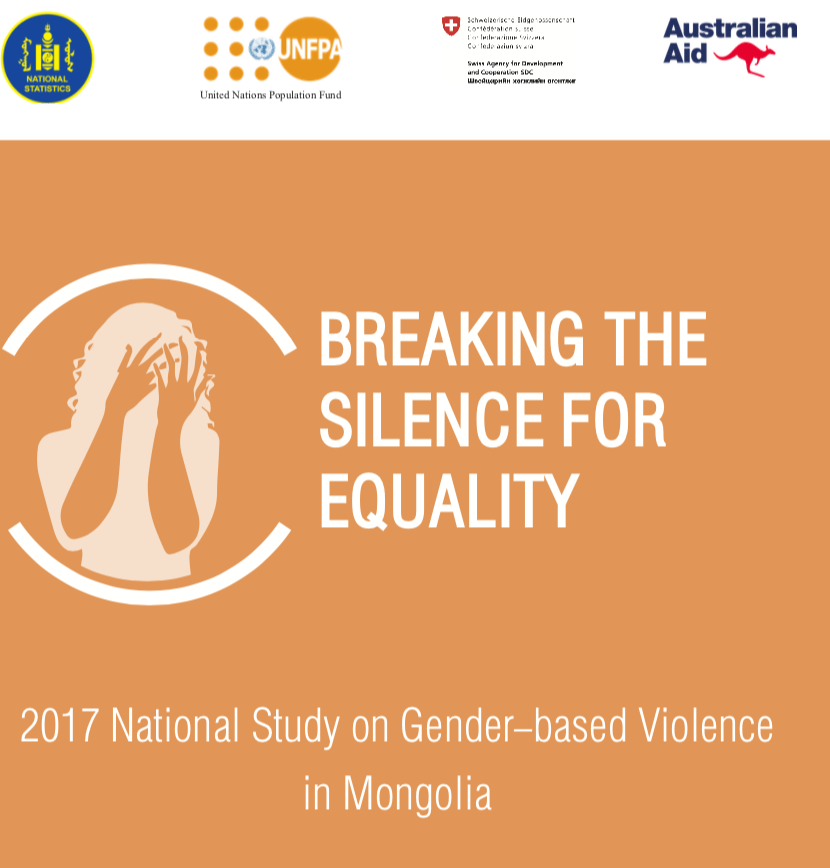ULAANBAATAR – Today, the United Nations Population Fund (UNFPA) and the National Statistics Office (NSO) released findings from the country’s first nationwide survey on gender-based violence.
Up until now, very little has been known about the prevalence and patterns of gender-based violence in Mongolia. Hence, there has been a real need for evidence to learn more about the prevalence, causes and consequences of gender-based violence, and in particular to inform policy directions. To address this lack of data, UNFPA Mongolia and NSO conducted a nationwide study on the prevalence of violence against women – Breaking the Silence for Equality: 2017 National Study on Gender-based Violence in Mongolia. This is the first large-scale quantitative and qualitative study on this topic that has ever been conducted in Mongolia.
The study breaks down intimate partner and non-partner violence revealing violence for both lifetime and within the last 12 months. Furthermore, the study also gathers and reveals the data for the different forms of violence; physical, sexual, economic and emotional violence, and controlling behaviours.
The survey, interviewed more than 7,300 women – uncovering extremely high rates of intimate partner and non-partner violence against women across Mongolia.
Key findings:
· Among ever-partnered women, 57.9% have experienced one or more of the following types of violence in their lifetime: physical, sexual, emotional and economic violence, and controlling behaviours; and 31.2% have experienced physical and/or sexual violence in their lifetime;
· Life-time rates of any forms of partner violence are highest in Khenti, Darkhan-Uul, Umnugobi, Ulaanbaatar, and Govisumer, while life time rates of physical and or sexual partner violence are highest in Darkhan-Uul, Umnugobi, Gobisumber, Bulgan and Khovd;
· The prevalence rates of violence are not necessarily highest in Ulaanbaatar, but mainly due to the large population, the number of victims is by far the highest in Ulaanbaatar;
· Non-partner violence is prevalent among young people. Since age 15, 17.3% of women have experienced non-partner physical violence during their lifetime and 4.5% experienced it during the last 12 months;
· 1 in 10 women experienced child sexual abuse before the age of 15; and
· 1 in 4 women, regardless of her social and economic status, agreed that a husband is justified in beating his wife if she is unfaithful.
"In order to address the high rates of violence against women in Mongolia, we need to understand it across all its aspects. The results from this survey help us to identify how, why and where violence against women occurs so services and interventions can be appropriately allocated,” explained Naomi Kitahara, UNFPA Representative in Mongolia
This landmark study provides comprehensive quantitative and qualitative information on gender-based violence in Mongolia, which will be used to inform the improvement of services and advocate for change. A key feature of this study is that it explores acts of violence against women that, in most cases, would otherwise have remained hidden behind closed doors. Also, for many women, exposure to partner violence is not their only experience. They may have also been subject to physical or sexual violence perpetrated by their parents, siblings, other family members, or complete strangers since the age of 15 years.
"We now have reliable and robust evidence about the extent and nature of violence against women in Mongolia. Having access to quality data reinforces the extent of the problem and the devastating impact violence has on individuals, families and communities,” explained NSO Chairwoman, Ms Ariunzaya Ayush.
“This data will be utilized to bring about policy and behaviour change to stop violence against women. We, at NSO, hope this data will be utilized to provide the best possible services to women who have been subjected to violence.”
Behind the data, lies powerful and often untold stories of violence against women and girls. Many victims of gender-based violence do not report or seek help. As per the survey estimation, only a small fraction of cases come to the attention of the police, therefore the level of under-reporting in Mongolia is high (105.4 per cent). Just as concerning, 26.5% of women who had suffered from physical and/or sexual intimate partner violence never told anyone about their experience. The survey aims to reveal the hidden stories, breaking the silence and bringing attention to the nation and policy makers the critical condition of gender-based violence.
Kitahara concluded that, “Violence against women deprives women of their right to fully take part in social and economic life. It causes a myriad of physical and mental health issues and in some cases results in loss of life. We must do everything in our power to put an end to gender-based violence.”
The 2017 National Study on Gender-based Violence in Mongolia received financial support from UNFPA, the Swiss Agency for Development and Cooperation, and Australia’s Department of Foreign Affairs and Trade.
About the survey:
The 2017 National Study on Gender-based Violence in Mongolia consisted of two separate components: a quantitative study based on the methodology developed for the World Health Organization (WHO) Multi-Country Study on Women’s Health and Domestic Violence against Women; and a qualitative study based on the methodologies adapted from other countries. The use of qualitative and quantitative components was to seek results that cross-checked and complemented each other. For the full version of the report in English or Mongolian, visit: www.mongolia.unfpa.org/en/publications
About UNFPA:
UNFPA is the UN agency delivering a world where every pregnancy is wanted, every childbirth is safe and every young person's potential is fulfilled. UNFPA Mongolia currently implements the 6th Country Programme 2017-2021, closely in line with the United Nations Development Assistance Framework for Mongolia. For more information, visit: www.mongolia.unfpa.org/en/publications Or contact: Mr Tim Jenkins, UNFPA, Jenkins@unfpa.org (8011-0366)


